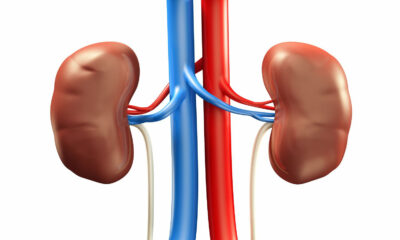Health
World Kidney Day: Six Ways You May Unknowingly Damage Your Kidney

Chronic Kidney Disease (CKD) is unarguably one of the deadliest ailments globally with millions of people dying prematurely of its complications every year.
It is also said that between 8 and 10 per cent of the adult population have some form of kidney damage.
Kidneys remove wastes and extra fluid from the body. They also detoxify acid that is produced by the body cells and maintain a healthy balance of water, salts and minerals.
To widen sensitisation on the spate of CKD and how to curtail it, every March 10 is earmarked for World Kidney Day. Sadly, a number of people lead a life style that slowly damages their kidneys without even realising it. Daily Trust looks at six ways kidneys can be endangered.
Eating Processed Food
Processed foods are significant sources of sodium and phosphorus. According to National Kidney Foundation, many people who have kidney disease need to limit phosphorus in their diets. Some studies have shown that high phosphorus intake from processed foods in people without kidney disease may be harmful to their kidneys and bones.
READ ALSO:
- Russia escalates false chemical weapons claims about US, Ukraine
- Russia strikes western Ukraine targets, renews push toward Kyiv
- Osinbajo, Atiku others grace installation of 42nd Olubadan
Do not miss sleep
Sleep is important to health and having enough of it will help regulate your kidney’s workload. A good night’s rest is extremely important to your overall well-being and, it turns out, your kidneys. Kidney function is regulated by the sleep-wake cycle which helps coordinate the kidneys’ workload over 24 hours.
Eating too much meat
Animal protein generates high amounts of acid in the blood that can be harmful to the kidneys and cause acidosis – a condition in which kidneys cannot eliminate acid fast enough. Protein is needed for growth, upkeep and repair of all parts of the body but your diet should be well balanced with fruits and vegetables.
Abusing painkiller
You may have a peaceful mind taking painkillers, but if you have a kidney problem, this comes with enormous consequences. Over the counter pain medicines may alleviate your aches and pains, but they can harm the kidneys, especially if you already have kidney disease. Reduce your regular use of NSAIDs and never go over the recommended dosage.
Not drinking enough water
Staying well hydrated helps kidneys to clear sodium and toxins from the body. Drinking plenty of water is also one of the best ways to avoid painful kidney stones. Those with kidney problems or kidney failure may need to restrict their fluid intake, but for most people, drinking 1.5 to 2 liters (3 to 4 pints) of water per day is a healthy target.
Excess alcohol intake
Regular heavy drinking has been found to double the risk of CKD. Heavy drinkers who also smoke have an even higher risk of kidney problems. Smokers who are heavy drinkers have about five times the chance of developing chronic kidney disease than people who don’t smoke or drink alcohol to excess.
Daily Trust
Health
NAFDAC destroys N5bn fake, expired products in Aba

NAFDAC destroys N5bn fake, expired products in Aba
The National Agency for Food and Drug Administration and Control (NAFDAC) has shut down 150 shops at Eziukwu Market in Abia over fake and expired products Worth N5 billion.
The agency disclosed this in a statement on Wednesday on X.
NAFDAC said the shops were shut during a two-day operation on December 16 and 17, while products valued at N5billion were destroyed at the market.
The director of the South-East zone, Martins Iluyomade, expressed dismay at the continued illegal activities despite a previous undertaking signed by market leaders in December 2023 to expose counterfeiters.
READ ALSO:
- Speaker Abbas to Tinubu: Your reforms have disrupted status quo
- Abuja demolition: Soldiers attack FCTA officials, seize vehicles
- Onion price rises over 100%, flooding, inflation blamed
According to the statement, Mr Iluyomade described the market as a hub for counterfeit and substandard products.
“Our team uncovered a large-scale production and distribution of fake and expired goods, including beverages, carbonated drinks, wines, spirits, and vegetable oils.
“Revalidated food items such as milk, yoghurt, noodles among others were also destroyed,” the statement said.
It reaffirmed NAFDAC zero tolerance for such practices and emphasised its unwavering commitment to safeguarding public health while working toward a permanent solution to the problem of counterfeiting in the market
NAFDAC destroys N5bn fake, expired products in Aba
(NAN)
Health
Eating fish regularly minimises risk of incurable hearing condition – Study

Eating fish regularly minimises risk of incurable hearing condition – Study
Tinnitus is the sound of ringing in the ears. It may also be described as roaring, buzzing, hissing, or clicking inside the head. The sounds may come and go. Or they may be ongoing. The sounds range in severity from a mild distraction to a disabling condition and may manifest with buzzing, hissing, or clicking inside the head.
The sound may happen in one or both ears and may have different tones. A team from Brigham and Women’s Hospital in Boston studied 73,000 individuals to understand how common this disorder is, which affects millions with a constant ringing in their ears.
Over a span of 30 years, those who consumed more than two servings of fish weekly had nearly 25 percent lower odds of getting tinnitus compared to those who seldom or never ate fish. Even eating just one serving a week resulted in a 13 percent reduced risk.
Certain types of fish, like tuna, light-fleshed varieties such as cod or halibut, and shellfish, were linked to a reduced risk, while darker fish like salmon and swordfish seemed to increase the risk.
READ ALSO:
- No litigation delaying Lekki int’l airport construction, says Lagos govt
- Ondo: Jilted husband kills self, sets wife ablaze
- Military sends Special Operations Brigade to quash Lakurawa terrorists
Interestingly, fish oil supplements, known for their benefits to heart, brain, and joint health, were also connected to a higher risk of tinnitus. It’s estimated that tinnitus is diagnosed in almost 1 in 6 persons.
While age-related hearing loss, ear injuries, and circulation issues are known to contribute to tinnitus, the exact cause remains unclear. Previous studies have suggested that dietary factors, such as high levels of calcium, iron, and fat, might heighten the risk. However, this new research is the first to analyse data over such a lengthy period.
Past findings have also shown that seafood can lower the risk of hearing loss, with one study suggesting that increased fish consumption might reduce hearing issues by up to 20 percent. Scientists believe that the omega-3 fatty acids in fish could protect inner ear cells or reduce inflammation caused by loud sounds, chemicals, or infections.
The Boston team’s investigation, based on a database of US nurses, aims to shed light on the connection between fish consumption and tinnitus, potentially aiding future patients. The authors of the study expressed hope that identifying factors that can be changed might help in preventing tinnitus and guiding targeted treatments.
Eating fish regularly minimises risk of incurable hearing condition – Study
Health
Nigerian doctor claims increased s3xual activity lowers cancer risk for women

Nigerian doctor claims increased s3xual activity lowers cancer risk for women
Dr. Rasheed Abassi, a Nigerian medical practitioner, has sparked widespread debate following comments on TVC’s programme Your View, where he recommended increased sexual activity for women as a way to reduce the risk of breast cancer.
The doctor also advised men to consider polygamy, citing its potential health benefits, including a lower risk of prostate cancer.
“Women need to have more sex to reduce breast cancer risk. When a woman reaches orgasm, she releases oxytocin, which lowers her chances of developing cancer,” Dr. Abassi stated during the interview.
READ ALSO:
- Four suspected suppliers of soldier, police uniforms to bandits arrested in Katsina
- Ogun father arrested for allegedly killing two-month-old son for ritual
- Midnight fire guts popular Alaba Rago Market in Lagos
Addressing men’s health, Dr. Abassi claimed that polygamy could improve longevity and reduce prostate issues. “Men with two to three wives live longer than men with one wife. If your son is not getting rid of his DHT (dihydrotestosterone), he is likely to develop an enlarged prostate,” he said.
He also linked the absence of regular erections to potential cardiac problems. “Any man not waking with a full erection already has cardiac issues. My oldest patient is 92 years old and has a four-year-old daughter — and that’s DNA-proven,” he revealed.
When asked about the risks of sexually transmitted infections (STIs) associated with increased sexual activity, Dr. Abassi emphasised the importance of safe practices. “The condom is not 100% protective, but we still advise it. Awareness is key,” he said.
He also noted that some men cite the cost of contraceptives as a challenge, comparing it to the financial costs of engaging in sexual activities.
Nigerian doctor claims increased s3xual activity lowers cancer risk for women
-

 Business2 days ago
Business2 days agoBe creative, monarch, others challenge Muslim professionals on economic revival
-

 Auto1 day ago
Auto1 day agoLSM MD extols founder’s qualities after latter posthumous industry award
-

 Entertainment1 day ago
Entertainment1 day agoMultiChoice announces free access to all DSTV channels for 3 days
-

 metro2 days ago
metro2 days agoJigawa State governor loses son 24 hours after mother’s death
-

 News1 day ago
News1 day agoNigeria Customs Service begins 2025 recruitment [How to apply]
-

 metro1 day ago
metro1 day agoHeavy security in Ilesa as ex-Osun deputy gov emerges new Owa-Obokun
-

 metro24 hours ago
metro24 hours agoLagos Imam to Tinubu: You haven’t disappointed us
-

 metro1 day ago
metro1 day agoDangote, Tinubu, Lookman named among 100 most influential Africans in 2024 (Full list)













